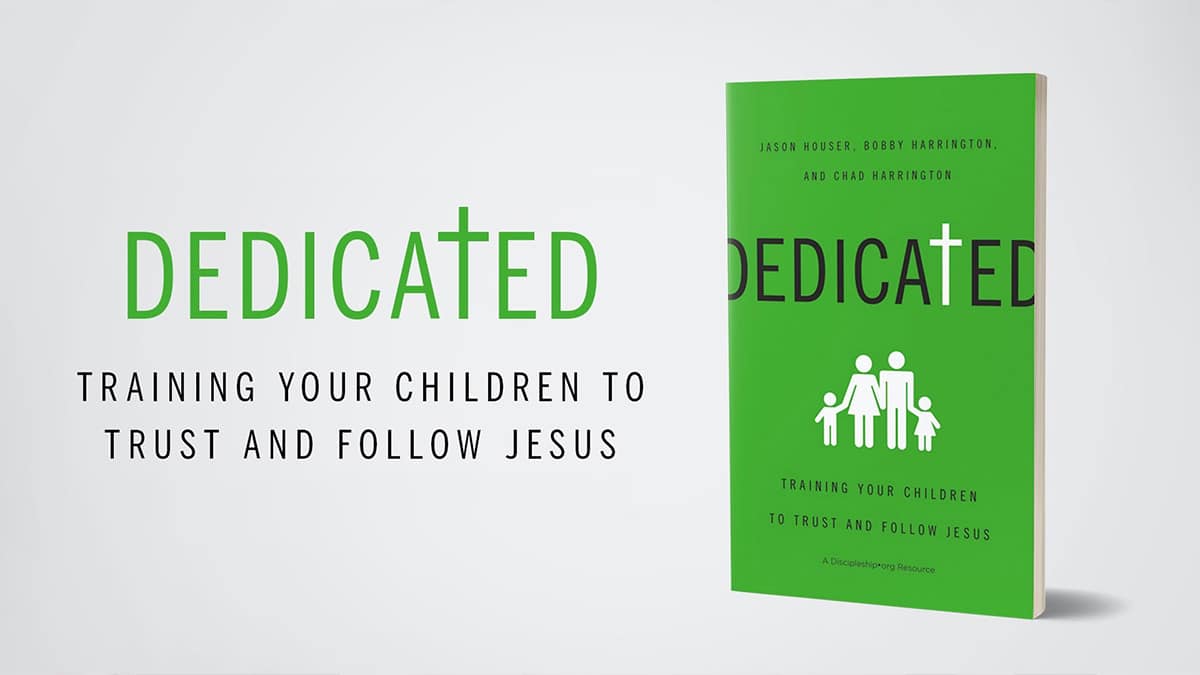Parents struggle with discipleship at home, but it’s the most important discipleship for parents. How does this work, though? And what is God’s heart about discipleship at home? Listen to Bobby and Chad Harrington speak on this topic from Deuteronomy 6, a message they preached together at the GO Conference in Toronto, Canada, in 2019.
Two Formats
- Read the adapted transcript of part of this message below (originally called “Discipling the Heart in the Home”).
- Stream the audio above and on Apple Podcasts, Google Play, and Spotify.
Deuteronomy 6:4–9 has the power to radically alter the trajectory of future generations. It paves the path, sets the course, and describes the game plan for parents who want to be faithful with their most important discipleship ministry. Here’s why this passage is significant:
- Jesus quoted this verse when asked about the greatest commandment.
- While he was in the temptation in Luke 4 and Matthew 4, he quoted from Deuteronomy 6, which raises the prominence of this text.
- It’s the famous Shema, which has been a treasured passage for millennia.
Jews of antiquity recited the Shema multiple times a day (as many Jews do even now).
Here’s what it says:
Hear, O Israel: The LORD our God, the LORD is one. Love the LORD your God with all your heart and with all your soul and with all your strength. These commandments that I give you today are to be upon your hearts. Impress them on your children. Talk about them when you sit at home and when you walk along the road, when you lie down and when you get up. Tie them as symbols on your hands and bind them on your foreheads. Write them on the doorframes of your houses and on your gates.
Pretty straightforward, right? So, what’s the challenge here?
The challenge is that very few of us actually do what this passage talks about. I totally understand because it sounds simple: just love everybody, love God, and teach your children. But the truth is that it’s hard work to consistently live out this passage.
It’s hard work to actually love everybody, love God, and teach your children.
It might be simple, conceptually, but it’s difficult in practice, because real love is difficult and discipling kids in general is hard.
My daughter, Emma, just turned one, and I’ll tell you, parenting hit me hard!
So, let’s talk about how we can all grow in this, and even if you don’t have biological children, this message is applicable to all of us. We can have spiritual children, and it’s all the same—except for the messy diapers!
But first, let me pause to give you a little background to this message with a word about my family
My Family History
All the images in this post come from my trip to Canada when we preached this message.
The featured image shows my grandfather, my dad, and I—left to right—standing in front of the barn my grandfather’s grandfather built with his own hands, just outside of Lindsay, Ontario, Canada, in the little town of Downeyville.
Here’s a larger version of that picture for the full effect.
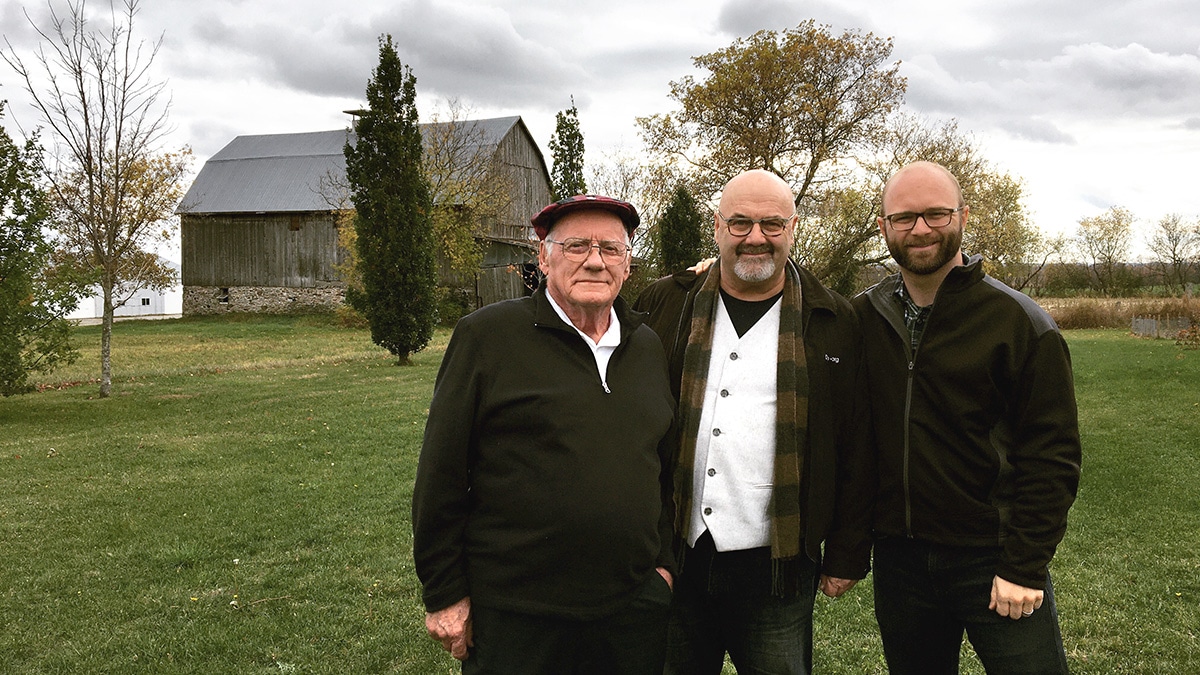
I stand in a line of Harringtons, and I am honored to be called a “Harrington,” even though our family has its fair share of faults. In this picture, I stand next to two great men who have passed down to me a good name, one I seek to keep honored as I pass it on to my children.
Our ancestors migrated in 1836 during the Irish potato famine. Good news for them: you can grow potatoes in the Canadian winter!
Homestead life in the country was difficult for the Harringtons, though. That’s where some of our struggles began. Yet God broke through the tough soil of our hearts, starting with dad’s conversion during his college years. His conversion sparked a revival in our family—one that even impacted my grandfather.
He’s always “Papa” to me, but William Benedict Harrington at birth and “Bill” to everyone else. He was renewed by God.
My dad was changed by God.
And I stand in this lineage of men and women being changed by God. Now, I look toward discipling my children, and I know we can only stand like this by the grace of God.
Hopefully, my family background will help you hear the rest of this message.
By the way, my dad and I share our story of discipleship at home and what we’ve learned thus far in our book with Jason Houser (of Seeds Family Worship) called Dedicated.
Discipleship at Home Is Harder Than We Expect
I remember my earliest days as a new dad… my wife and I came home from the hospital with our daughter, and it was like, What do we do with this child?! We have to keep her alive? All she could do, really, was eat, sleep, and make messes.
And there’s really only one word for those late nights, sleepless nights, and early mornings: work.
You think it’s glorious to have a child (which it is), but it’s also plain difficult. Yet when the baby is there, you instantly forget all the pain, right? I think I know why God made kids so cute…
It is so that we would keep them!
On a serious note, though, I learned something important from my dad about challenges in life:
My dad taught me that life is often a lot harder than you would expect, and that’s true with parenting.
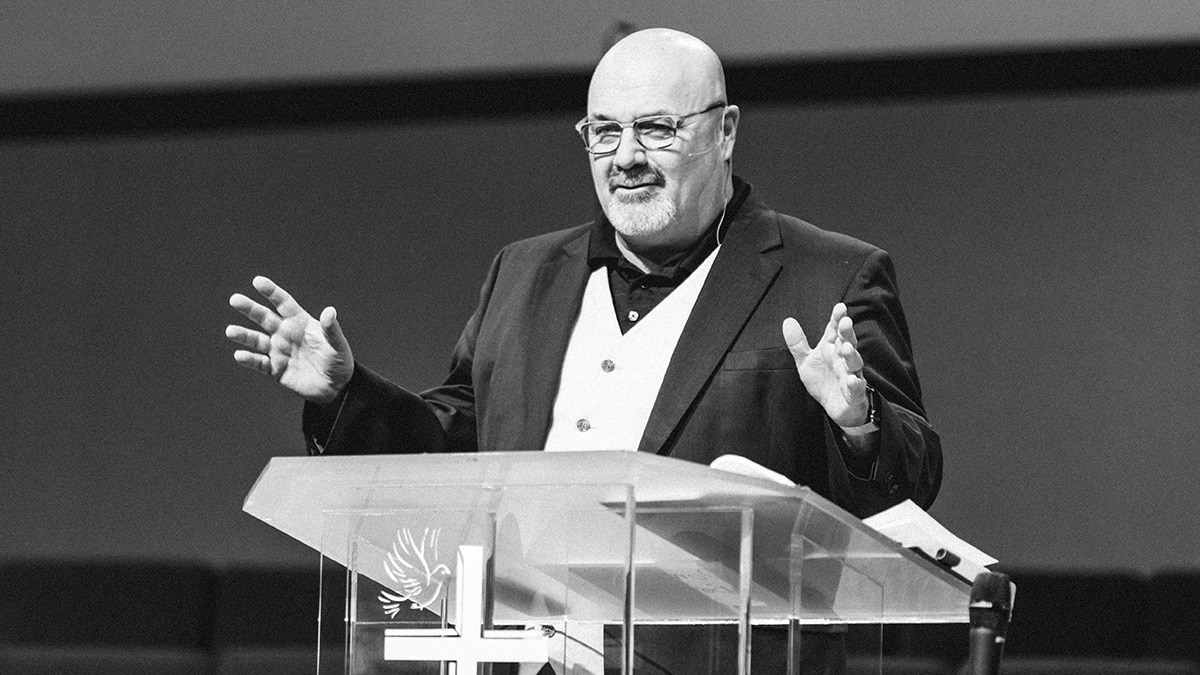
Bobby Harrington preaching at the GO Conference.
John Piper once said that life is going to be hard no matter what, so you might as well experience life being hard with Christ, instead of apart from Christ.
When we make disciples at home, the work load can be heavy, sure (at least when we take our job seriously).
But here’s what I want to say: Deuteronomy 6 offers us a framework that can revolutionize our plan for parenting—for the most important discipleship parents do.
So, let’s dig into this passage and really try to understand the essential parts of it.
The First Word of Discipleship at Home
The first word that we come across in Deuteronomy 6:4 is “hear,” and I just want to pause there because that is the word in Hebrew: shema. I bring it up because it doesn’t just mean “to listen” like, “I hear the words you’re saying.”
Shema is an instruction word in Hebrew that means “hear, listen, and obey” in one word.
When you are parenting, this is really important, right? You don’t want your kids just to listen to the words you’re saying. You want them to obey!
And we are making disciples of spiritual children, as well. We don’t want them to just listen. We want them to truly hear us.
The culture today tells us that spiritual authority is just another opinion. But parents have to steward God’s delegated authority (by virtue of just having kids), and we’ve got to teach our kids that when our give instructions, they need to obey us.
So, it starts with teaching our children to hear-obey us, because if we can teach them to truly listen and obey the first time—not the third time or fourth time—if we train them in this way, then when we eventually teach them to hear God, the transference works way better because they’re used to first-time obedience.
God Calls Us into His Unity
“Hear O, Israel, the LORD our God, the LORD is one.”
Now what does this part mean? Isn’t that interesting? Why don’t we just skip to the love part?
Before we get to the command to love God, the first thing that we need to teach children (and remind ourselves) is that God is whole and is complete.
God is integral. He’s one.
This concept is lost on us today, I think. But it’s important for us to understand because God’s about to call us to something and unless we understand his unity, we won’t fully grasp the command. He’s calling us into his unity, into his integrity, into his purity of identity.
God says, “Love me with everything, the inside and the out.”
God, in his purity, is not going to call us into something that he’s not. And so God the Father leads by example. It’s as though God is saying, in other words, “Be like me. I am one. Be complete like me.”
God shows us what love looks like in his personhood, and he invites us to join his fullness.
Loving God Comes Back to Training
As I’ve talked with my wife and we’ve tried to figure out this parenting thing, I’ve had to really think more about the Shema. My parents did a great job teaching, but every generation has to figure it out new and hopefully, at a minimum, sit on the shoulders of their parents.
What I experienced in school and what I will experience in the church and in the world is much different than what my dad and what my grandfather have experienced.
We each have to ask the Holy Spirit to teach us how to teach our children and how to raise up the next generation.
The goal of parenting is not just teaching our kids to survive but training them to thrive.
That’s why my father and I subtitled our book with Jason Houser as we did—Dedicated: Training Your Children to Trust and Follow Jesus—because we can teach our kids to eat with a spoon by feeding it to them, or we can train them how to feed themselves. Training our children is the name of the game, not simply raising them.
Training Comes Back to Love
Here’s the thing: training takes much more work, and that’s why it comes back to love.
So, as you talk with your spouse and as you train your children, remember the goal is love. We will train our kids to do many spiritual disciplines—like pray, memorize Scripture, and submit to authority…
But it all ultimately comes back to love, and we have to explicitly and clearly remind ourselves and those we disciple of this goal.
But here’s the key to following this command to love:
We must live by God’s definition of love because the culture has hijacked “love.”
The devil loves it when the culture redefines words. He’s like, “Oh, yeah, this is love, isn’t it?”
Today’s culture says, “If it feels right, do it. God is just another option on the buffet of life. Love is the main course and there are lots of flavors.”
How we define love as we follow Jesus is the name of the game.
The volume of content coming through media channels—whether it’s Netflix, YouTube, someone’s blog, or Facebook—it’s all instant and it’s massive.
We have to not only outdo the culture in terms of truth but also with regard to the volume of content.
Speak Truth to Your Children
So, how often do we speak the Words of God from Scripture to our children? Not just, “Let’s go to church,” and farm them off to “the professionals.”
No, discipleship is our work as parents. It’s the work of the people, not just the clergy.
Nobody can disciple your kids better than you. Nobody.
Orient your life toward this.
This is the task that we have as parents—more than sports, more than church attendance, or youth group attendance, and more than sending our kids to private school. We don’t farm out discipleship. Discipleship is homegrown.
So, first we win the game by defining love with God’s definition of love.
Then, we must rightly handle Words of God as best we can
In Isaiah 66:2, it says:
This is whom I esteem. He who is humble and contrite in spirit and trembles at my word.
Tremble at God’s Word
Do you tremble at God’s Word, or is it just another option? How do you treat the Word when it comes up in conversation?
Because our culture puts the Word down low. But someone who trembles at God’s Word holds it high.
When they hear God, they obey. They don’t question it. They don’t contextualize it to the point of watering it down.
How do we fight to win the war of words? It’s with reasonable words, and that starts by listening to our children. I will even say this:
If we want to reach the coming generations, we have to be willing to listen to them.
Love God with All Your Heart, Soul, and “Muchness”
I’m a millennial (born in 1986), and if you want to reach people like me (and younger), start by listening. The way younger people think is so different than the way older people think. It’s like night from day.
Let’s look back to Deuteronomy 6:5, it says:
Love the LORD your God with all your heart, with all your soul, and with all your strength.
What does that mean?
All Your “Heart”
“Heart” in Hebrew means everything inside you.
Notice how Jesus adds the word “mind” in Matthew 22:37–39. Jesus was merely extrapolating the Hebrew word for heart and saying it contextually for the Greco-Roman world. Greeks separated things out more than Hebrew-speakers.
All Your “Soul”
Then “soul” in Hebrew is nefesh, which this is an important word. The meaning is more akin to our “body” than our “soul.”
In Genesis 1:2, the same word is used in the phrase nefesh chaya talking about animals God created. What this word delineated was that the animals actually became embodied beings. They now were living nefesh. They had gained physical substance.
We’re called to love God with all our “nefesh“.
Here’s why this distinction is important: it completes the inside-out dynamic to which God is calling us into. Now, you can think about how there’s only two aspects of who we are as persons: 1) the inside person—emotions, thoughts, and feelings—and 2) the outside person, which is our bodies and our social environment.
So, all that God is saying through Moses in the Shema of Deuteronomy 6 is this:
Love God with everything on the inside and everything on the outside.
Then, there is the word for strength, and it actually is not the word for “strength” in Hebrew, but “muchness.”
… and with All Your “Muchness”?
“Strength” is simply an easier translation, which is why we use it, but there’s more going on here. It’s very interesting that Moses chooses this word ma’od in Hebrew, which normally just means “much.”
It’s almost like saying,
Okay, God is one, so how can we express this unity into which he calls us? Everything on the inside, everything on the outside… and very much!
God is calling us to give him everything we’ve got: our total obedience is the goal, not just church for an hour and a half on Sunday. What does this mean?
Total obedience means loving God with everything we are, energized by his grace.
This is not something we do one day a week; it’s something we do every day of the week. We must train our children in this, but it starts with us personally.
Cast a Kingdom Vision

Dad looking out at Niagara Falls during our trip to Ontario.
So, from the beginning, we must saturate ourselves in and cast a kingdom vision like this. We’ve got to have a transcendent purpose instilled in our own hearts.
Then, we should have a relationship with our kids that’s not just a buddy relationship, but a training relationship, too.
Our relationship with our kids will be closer than by any other way, if we train them for God’s kingdom, not to build their life’s kingdom.
It’s the deepest connection a parent can have with their child.
But we’ve got to give this type of relationship to receive it, which is really a gospel message. You give yourself away to your children as a servant of the King, and as we give ourselves away, we’re filled up.
You’ve got to really believe in the cross and the resurrection to truly give yourself away in self-denial.
What does this look like in practice?
Sitting down at home and walking along the road—with God as a topic of conversation.
When we were sitting at home while I was growing up, I would ask my mom and dad all sorts of questions. My dad was a pastor, so asking Bible questions was easy. I thought, I’ve got the pastor sitting at home. I’m gonna ask him all these sorts of questions. This is great!
And he would always tell me, “Go get your Bible.” And I would think, Come on, Dad. You’ve got that thing memorized.
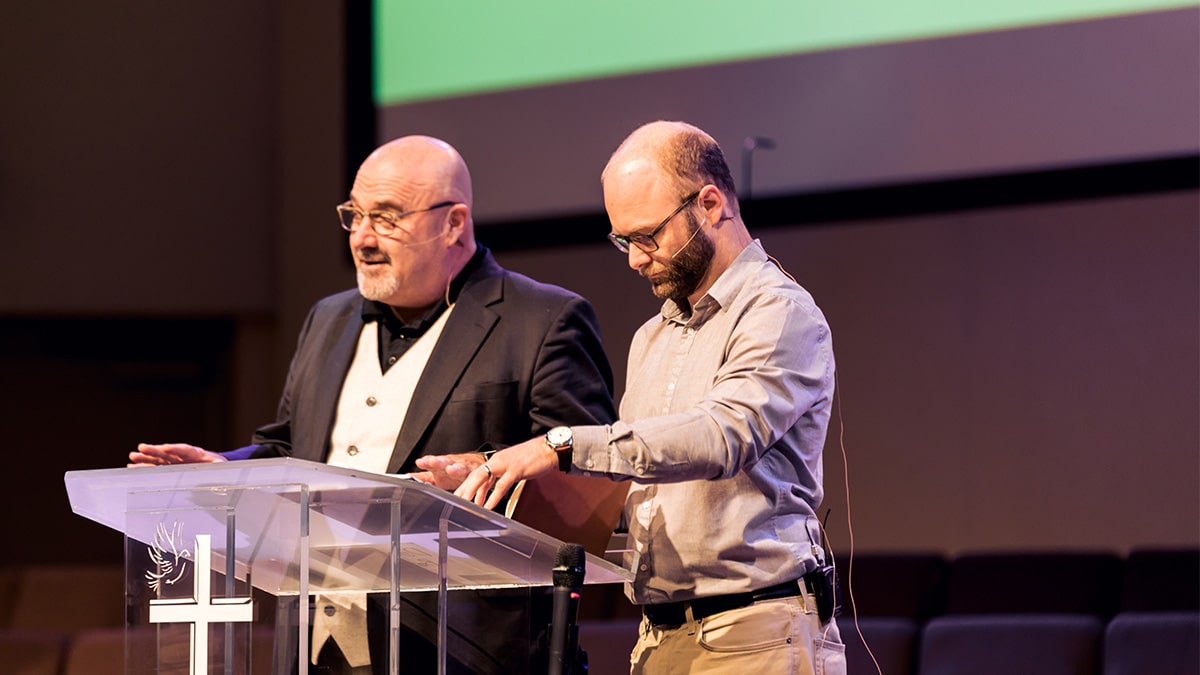
Dad and I preaching at the GO Conference in Ontario.
So I’d run upstairs, run back downstairs, and say, “Okay? Now what?”
Then, with seemingly encyclopedic knowledge, he instructed me to turn to 1 Corinthians 5 and to Matthew 22 and ….
Train Your Children in the Kingdom
You know why he didn’t spoon feed me the truth? Because he was training me for the kingdom.
Go get your Bible.
You know what I say now to my one year old? Not much yet.
But I’ve got the tools I need to do what’s necessary to train her as I was trained.
My daughter and I were walking around the neighborhood in Nashville, Tennessee. I was just strolling my six-month-old daughter (at the time), and I thought about Deuteronomy 6:
Oh man, she’s gonna learn English soon. What am I going to say?
And you know what? With my 6.5 years of theological education, I have every reason to know how to disciple my kids, yet I was speechless in that moment. I kept thinking, Oh, no, what am I going to do? Before I had kids, I thought this would be simple.
So, I decided, What’s the most basic thing I could teach Emma? And even though she couldn’t understand me, I started practicing this with my daughter.
I said to her, “Emma, what’s the most important thing to do in life? Love God!” Then, I said, “Emma, who do we fear? No one but God.”
She didn’t say anything, but that didn’t matter. I was preparing myself for the long road ahead.
Train Yourself, Train Your Children
I was trying to train myself to train my daughter, and you know what was shocking? Although it was felt awkward, although I didn’t know what to say, it felt right. I just started, and I’m going figure it out with my wife as we continue our journey of parenting.
We’ve all got enough knowledge to keep our kids’ heads spinning for a long time, so just start! If you don’t know what to do, you can just try.
I encourage you to, before the end of the day, take a look at Deuteronomy 6.
Look at the specific instructions and just write out a plan for discipleship. It doesn’t have to be perfect. Even just write down your next step. You can change it later, but start your family’s spiritual plan.
Write down just one thing you can do:
- While you’re sitting,
- While you’re driving or walking,
- When you’re putting your kids down to sleep, or
- When you’re waking up with your family…
… or something you could put on your walls or on your door frames or on your front door.
Find ways to totally integrate the Word of God into your life.
In the end, we must all find ways to help us—and our families—simply love God with all our heart, soul, and muchness.
There’s no greater discipleship for parents than discipleship at home.
Subscribe to HIM Publications to get weekly blogs like this delivered to your inbox.
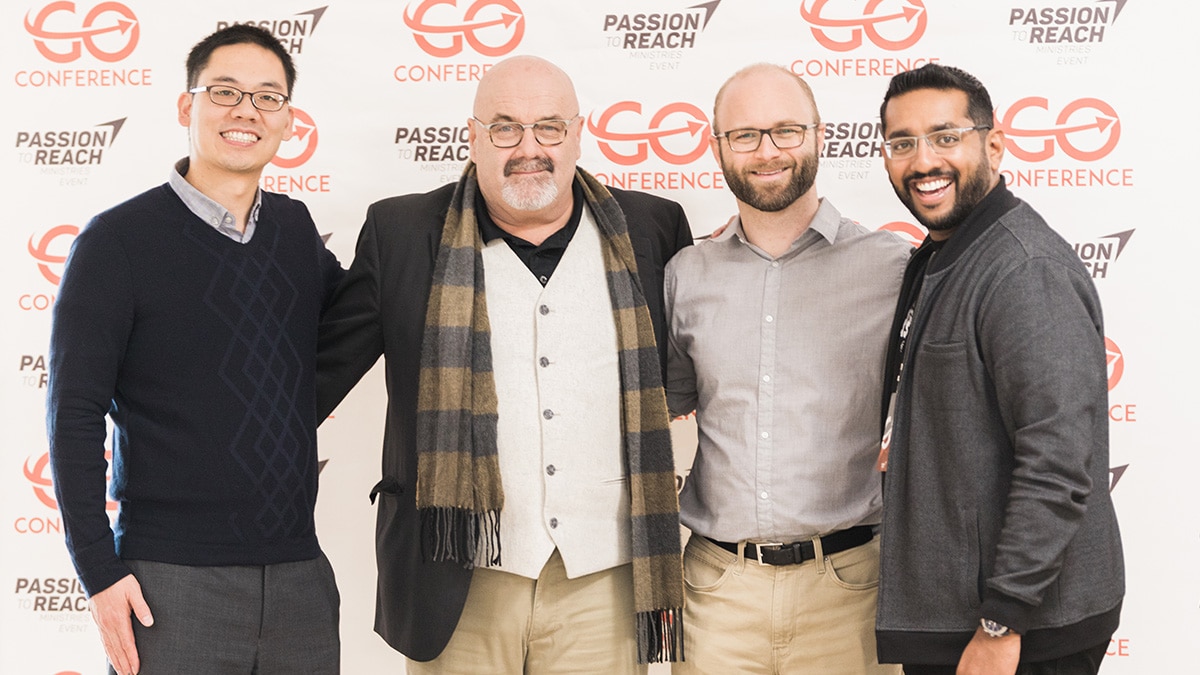
GO Conference 2019 speakers: Alexander Chu, Bobby Harrington, Chad Harrington, and Finu Iype (left to right).

